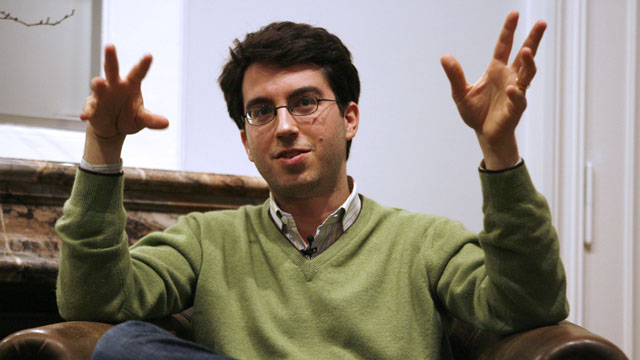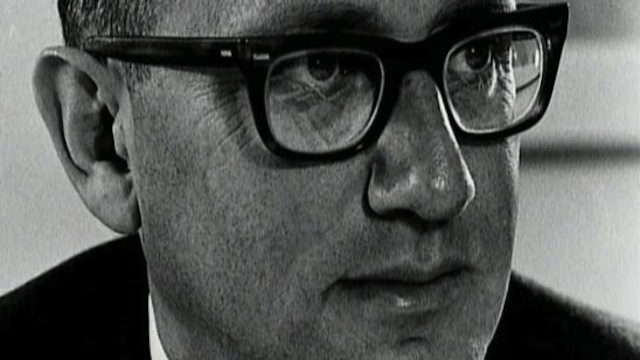“Anyone who’s ever waited at the Post Office, applied for a driver’s license, or filled out a tax return knows that government is no model for efficiency.” The Adam Smith Institute Blog opines.
All Articles
“Government policies to prop up the housing market not only have failed to fix the problem, they are prolonging the agony.” Nobel Laureate Joseph Stiglitz on how to fix the housing crisis.
I still remember seeing the Tribute in Light from the New Jersey side of the Hudson. From a distance, the twin beams of light standing where the World Trade Center […]
Yesterday, U.S. District Court for the Central District of California Judge Virginia Phillips declared the military’s “Don’t Ask, Don’t Tell” policy unconstitutional. In her ruling—which comes on the heels of […]
Laboratory tests find that exposure to sexual stimulus makes individuals impatient. Does this mean that people in more sexualized societies are less likely to save money?
Novelist Jonathan Safran Foer wants you to stop eating meat—not because he cares so much about the fluffy animals, but because it’s killing the environment. In his Big Think interview Foer shared with us just how devastating the factory farm industry is, something he learned while researching his first work of non-fiction, Eating Animals. “Animal agriculture is the number one cause of global warming, and yet very few people, including people who are normally quite political and quite moral and moralizing, talk about it. And even fewer people act on their concerns about where food comes from.”
The reason changing Americans’ eating habits is so difficult is because eating meat is ingrained in our cultural narratives as Americans. “Food is not just fact and it’s not just reason; it’s culture, it’s personal identity,” Foer says. “It’s what our parents and our grandparents fed us, it’s how we think of ourselves, and it’s always attached to some kind of a story. And that confuses things. The Thanksgiving turkey confuses things. The Christmas ham confuses things. Every family has its own version.”
And creating a new narrative that excludes meat will be tough largely because Americans are subsidized to eat this way. American farm subsidies lower the price of meat while encouraging inhumane and environmentally damaging farming practices, so much so that the real cost of a 50-cent hamburger, factoring in environmental costs, is actually $200. Plus, the subsidies hamstring farmers that use traditional, non-industrial methods of farming: “We have now created an economic system which is very advantageous to feed animals unnaturally, house them unnaturally, and raise genetic stocks that are destined for illness,” Foer says. “And the small farmers, who are really the heroes of my book, farmers at places like Niman Ranch, farmers like Frank Reese at Good Shepard, farmers like Paul Willis, are at a severe economic disadvantage for doing things the right way; for being environmentally responsible; for treating their animals like animals rather than like rocks or pieces of wood.”
Foer told us that change is very necessary but possible, debunking the idea that industrialized factory farming is necessary to feed the world. The idea that factory farming is necessary to feed the nearly 7 billion inhabitants of earth is “not only untrue, it’s the opposite of the truth,” he says. “It takes seven calories of food input into an animal to produce one calorie of food output. It’s an extraordinarily inefficient way to produce food.” And if the Chinese and Indians begin to eat like American do, which has been the trend in the developing world, “we’re going to have to farm twice as many animals as we do now.” That would amount to 100 billion animals every year.
Foer also spoke to us about his fiction work, telling us that he values the freedom of fiction but that the same freedom is what makes fiction so difficult. And he gave us his take on the film adaptation of his debut novel “Everything Is Illuminated” as well as his thoughts about the form of the novel in the age of the iPad. Literature has always been “slower than the other art forms to grapple with technological and cultural changes…and I think that’s one of the things that people love so much about it,” he said. Whereas music and the visual arts have changed dramatically in the past 100 years, literature has remained largely the same. “Maybe it’s been the saving grace of literature to be so conservative,” Foer muses. “But maybe it will contribute to its death.”
Why exactly do fights break out when people are drinking? You might think it’s simple biochemistry—alcohol molecules wreaking changes on brain cells, leading to behavior change, leading to a broken […]
Blogger David Xia friend swiped this card from Citibank while he was there for an interview. It’s a list of tips for women on how not to sabotage their careers […]
Stephen Hawking’s latest book Grand Design sits atop the Amazon best-seller list and has been the subject of gobal news attention and debate. Driving discussion (and sales) is Hawking’s “no […]
Some factions within the natural childbirth movement are attempting to popularize the concept of “birth rape.” The idea is that women who are handled roughly, verbally abused, or bullied into […]
Two small asteroids that were discovered on September 5th by the Catalina Sky Survey near Tucson, Ariz., whizzed past the Earth on Wednesday. According to scientists, the first asteroid (2010 […]
Well, it has been a long week and my brain is pretty close to liquified after teaching and submitting my paper, so let’s end the week with the first Mystery […]
“The role of Latinos in American society is growing inexorably, with big political implications for the future.” The Economist reports on the Hispanicisation of America from the southwest.
“Subway trains will generate power for the grid with a battery that captures power from the braking trains.” Technology Review reports on energy innovation out of Philadelphia.
“Did computerization create the Great Divergence?” Slate asks if the current American class divide was worsened by the emergence of computers and the 1990’s digital divide.
“The narrative of men rejecting metrosexuality and reclaiming their manhood makes perfect marketing sense.” Douglas Haddow says being a man’s man is the next trend in manhood.
“Obama is a clear and knowing accessory to war crimes, and should at some point face prosecution.” The Atlantic’s Andrew Sullivan on Obama’s use of executive privilege.
“Up and down society, people are moving away from commercial, productive activities and toward pleasant, enlightened but less productive ones.” David Brooks on economic change.
“Is cosmology a form of theology for a secular age? Cosmology is so popular, not just because of the science, but because it allows us to ask the big questions. It’s metaphysics by other means.”
Imagine everyone decided to stop producing fossil fuels tomorrow. Global warming thresholds calculated by climate change scientists would not be crossed. Danger lies in future production.
“The sequel to the 30-year-old ‘The Official Preppy Handbook’ reminds us that you don’t necessarily need to have money to have class.” Columnist Megham Daum on her favorite book.
“Too expensive, too heavy and unnecessary: Brazilian aircraft manufacturer Embraer hold copilots in low regard. So, now the company plans to replace them with a computer.”
In the midst of the circus surrounding Pastor Terry Jones’ plan to burn Qurans on the anniversary of September 11th, perhaps the most disturbing aspect is the emerging meme among […]
It has been known for some time that religious belief and behavior affect the brain. But can we pinpoint specific chemicals, genes and clusters of neurons that give rise to religiosity, or to atheism?
It is technically illegal for the government to torture prisoners. Almost no one would deny that. Section 2340 of the federal criminal code makes it a crime punishable by up […]
In Greek mythology, the gods sometimes punished man by fulfilling his wishes too completely. This is the first line of Henry Kissinger’s 1957 Nuclear Weapons and Foreign Policy. Always controversial, […]
After a busy day where I finally send off my paper on zircon and the magmatic evolution of the Okataina Caldera Complex… A new Smithsonian/USGS Global Volcanism Program Weekly Volcanic […]
Enjoying a piece of music or recognizing the face of a loved one seems like a simple, instantaneous process. But like all things associated with the brain, they aren’t. Both […]
Former CBS news correspondent Jere Van Dyk talks about the survival skills he used to get through a 45-day kidnapping ordeal in Afghanistan where his life was threatened daily.
Two volcanoes are keeping our attention right now: Sinabung, Indonesia Halfway around the world, activity at Sinabung continues to be cause for increasing concern. The volcano is experiencing larger and […]

















